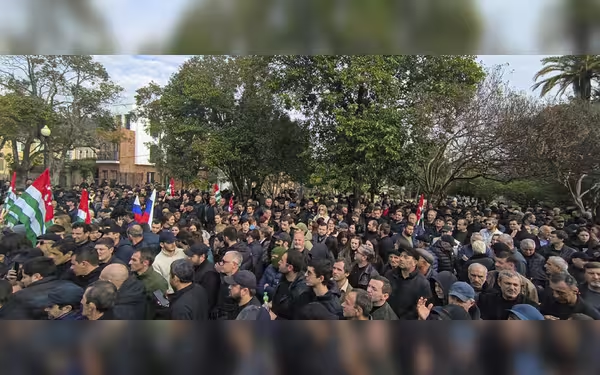Saturday, November 16, 2024 07:49 PM
Protesters Storm Abkhazia Parliament Over Controversial Russia Deal
- Protesters storm parliament over investment deal with Russia.
- Opposition demands resignation of President Aslan Bzhania.
- Emergency services report injuries amid escalating unrest.
 Image Credits: arabnewspk
Image Credits: arabnewspkProtesters storm Abkhazia's parliament, demanding the resignation of President Bzhania over a controversial investment deal with Russia.
In a dramatic turn of events, protesters stormed the parliament of Abkhazia, a breakaway region of Georgia backed by Russia, on Friday. This unrest was sparked by an unpopular investment agreement with Moscow, which many locals fear could negatively impact their property market. The situation escalated quickly as opposition politicians called for the resignation of the self-styled president, Aslan Bzhania, amid growing discontent among the populace.
The protests began when demonstrators used a truck to break through the metal gates surrounding the parliament building in the capital, Sukhumi. Eyewitness videos captured the chaos, showing individuals climbing through windows after removing metal bars and chanting in the corridors. Eshsou Kakalia, an opposition leader and former deputy prosecutor general, declared that the parliament was now under the control of the protesters. He stated, "We will now seek the resignation of the current president of Abkhazia," as reported by Russia’s Interfax news agency.
In addition to storming the parliament, protesters also broke into the presidential administration offices located within the same building. Emergency services reported that at least eight individuals were taken to the hospital due to injuries sustained during the unrest. In response to the escalating situation, the presidential administration announced that they were preparing to withdraw the controversial investment agreement with Russia.
This investment agreement, signed in October by Russian Economy Minister Maxim Reshetnikov and his Abkhazian counterpart, Kristina Ozgan, was set to be ratified by Abkhazian lawmakers on the day of the protests. Opposition leaders argue that the agreement would allow for an influx of Russian investment, which they believe would drive local residents out of the property market.
The opposition issued a statement clarifying that the protests were not against Russian-Abkhazian relations but rather a plea to protect the interests of local citizens. They emphasized, "Abkhazian society had only one demand: to protect the interests of our citizens and our business, but neither the president nor the parliament have heard the voice of the people until today." This sentiment reflects a growing frustration among the populace, who feel their concerns are being ignored.
Earlier in the week, President Bzhania convened an emergency security council meeting after protesters blocked a key highway and rallied in central Sukhumi, demanding the release of four activists. These activists had been detained for opposing a law regulating the construction industry, which referenced the contentious Russian-Abkhazian agreement. The activists were later released, but the incident highlighted the rising tensions in the region.
This is not the first time Abkhazia has witnessed such unrest. In 2014, demonstrators stormed the presidential headquarters, leading to the resignation of then-leader Alexander Ankvab over corruption allegations. His successor, Raul Khadzhimba, was also forced to step down in 2020 following protests over disputed election results. These events illustrate a pattern of political instability in the region, fueled by dissatisfaction with leadership and external influences.
As the situation in Abkhazia continues to unfold, it raises important questions about the future of the region and its relationship with Russia. The protests serve as a reminder that the voices of the people cannot be easily silenced, and that local concerns must be addressed to maintain stability. The outcome of this unrest could have significant implications not only for Abkhazia but also for the broader geopolitical landscape in the region.













